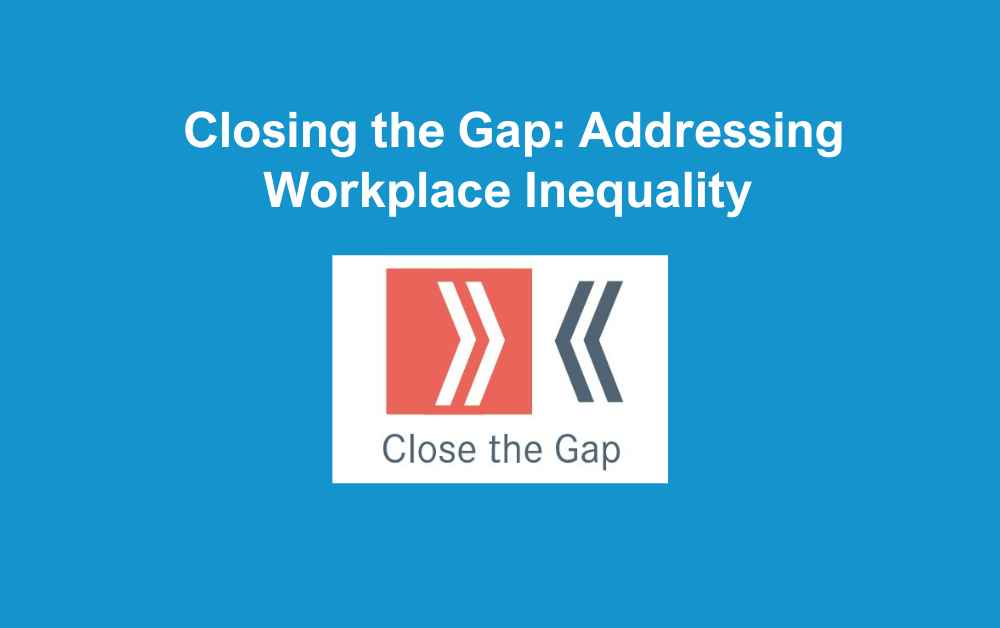At The HR Booth, we are passionate about fostering great workplaces and encouraging employers to prioritise closing the gap. Our recent podcast featured Lindsay, Head of Policy and Development at Close the Gap, an organisation dedicated to tackling women’s inequality in the labour market. We had an insightful conversation about gender equality in the workplace, the progress that has been made, and the work that still needs to be done.
The Role of Close the Gap
Close the Gap is the UK’s expert organisation working to address gender inequality in employment. Their work includes research to close data gaps, policy advocacy, and direct employer support through tools, guidance, and training. One of their flagship initiatives to closing the gap, Equally Safe at Work, helps employers tackle gender inequality and violence against women within their organisations. They support businesses of all sizes—from small enterprises to large corporations—offering tailored resources to help employers take action.
The State of Gender Equality in the Workplace
Over the past decade, there has been progress in addressing gender inequality at work. Regulations requiring employers to report their gender pay gaps have created greater visibility around the issue. However, reporting data is just the first step—turning that information into meaningful action is the real challenge.
While we are seeing positive changes, such as an increase in the number of women in boardroom positions, there is still a long way to go when it comes to closing the gap. Often, women in leadership are confined to non-executive roles rather than positions of real decision-making power. Additionally, women remain underrepresented in senior operational and executive positions, which highlights the need for continued focus on progression and workplace culture.
Barriers to Equality
One of the most persistent barriers to workplace equality is the lack of flexible working options. Many women struggle to find roles that accommodate caring responsibilities, forcing them to leave the workforce or accept lower-paid positions. Flexible and part-time work is still uncommon in senior roles, making it difficult for women to progress.
Lindsay shared an inspiring example of how small changes can make a big impact and go a long way to changing the gap. First Bus, a major public transport provider, introduced part-time bus driver roles, doubling the number of women in their workforce. This simple yet effective change widened the talent pool and helped address gender imbalance.
Young Mothers Employment
One of Close the Gap’s key focus areas is improving employment opportunities for young mothers, who are among the most excluded groups in the labour market. Many young mothers face significant barriers to securing and maintaining employment due to a lack of flexible work opportunities, unaffordable childcare, and societal biases.
A major issue is the absence of comprehensive data on the specific challenges young mothers encounter in the workforce. This data gap makes it difficult for employers to implement targeted policies and support measures. Close the Gap’s upcoming project in collaboration with Save the Children aims to address this by conducting research and developing resources to help employers understand the challenges and opportunities for supporting young mothers in the workplace.
Employers can take proactive steps to closing the gap by offering part-time roles, remote working options, and enhanced parental leave policies. Creating an inclusive and supportive environment can unlock a wealth of untapped talent, benefiting both businesses and working mothers. By acknowledging and addressing these barriers, organisations can help young mothers build sustainable careers while balancing their parental responsibilities.
How Employers Can Drive Change
For employers looking to create more inclusive workplaces, here are some key takeaways:
- Offer Genuine Flexible Working – Many businesses provide hybrid working, but flexibility needs to be meaningful. Employers should explore job-sharing, part-time opportunities, and adaptable schedules.
- Support Working Parents – Employers should implement policies that assist parents returning from maternity or paternity leave. Keeping in touch days, newsletters, and ongoing communication can help employees feel valued and included.
- Address Workplace Culture – Gender equality is not just about policies; it’s about workplace culture. Employers need to ensure that women feel supported, safe, and given equal opportunities to progress. This is an important effort in closing the gap.
- Move Beyond One-Day Initiatives – While International Women’s Day is an excellent time for reflection, gender equality should be a priority all year round. Employers must take concrete, ongoing action.
- Utilise Available Resources – Close the Gap provides a range of free tools, such as Think Business, Think Equality for SMEs and Close Your Pay Gap for larger employers. These resources help businesses identify practical steps to improve gender equality.
The Road Ahead
Looking forward, Close the Gap aims to continue advocating for workplace equality, expanding their research and support for employers. One of their upcoming projects focuses on young mothers in the labour market, aiming to identify and address the unique barriers they face. They will be partnering with Save the Children on this over the next couple of years.
As employers, we must do more than acknowledge gender inequality—we must take action to address it. Whether through improving recruitment practices, implementing better maternity support, or tackling workplace harassment, every step taken contributes to lasting change.
For those interested in learning more about Close the Gap’s work and accessing their tools, visit:
- Close the Gap – www.closethegap.org.uk
Watch The Full Podcast
To gain deeper insights into the work of Close the Gap and hear Lindsay’s thoughts firsthand, we encourage you to watch the full podcast. In our discussion, we explore practical steps that employers can take to bridge workplace inequalities and create lasting change. Don’t miss this opportunity to learn how your organisation can make a difference.
This International Women’s Day, let’s not just talk about equality—let’s take action to closing the gap.







